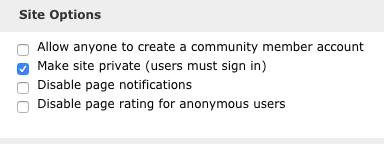Site Privacy - make your site public or private
- Applies to:
- All versions
- Role required:
- N/A
Site Privacy is the highest level of who can access your site and how.
Control more granular content access through page permissions.
Private versus Public Site Privacy
- Public: Anyone can find and see your site, and you can privatize sections, pages, or paragraphs to control access to content. A public site has high online visibility, and search engines can find, index, and list its content.
- Private: Access is restricted to people with a login. A private site has no online visibility, and search engines cannot find, index, or list its content.
Configure your site as a public site so that users can find your content via search engines.
Do not make your site public until you are ready for search engines to index your content.
You can also make a private site public. This is useful if you want to work on your site "behind the scenes" and launch it when it is ready for the world to see, or if you have a private site that you want to open up for users to find information more easily.
Alternatively, you can make your site public and privatize pages or sections. You can also conditionalize content to restrict information access to certain users.
Configure your site to be Public
- Navigate to Site tools > Control panel > Systems Settings > Configuration.
- Under Site Options, set the Make site private (users must sign in) checkbox to not be selected.

Configure your site to be Private
- Navigate to Site tools > Control panel > System Settings > Configuration.
- Under Site Options, select the checkbox for Make site private (users must sign in).

User and business impacts
Public site
- User access: Users do not have to log in. Sections, pages, and paragraphs can be privatized to restrict public access.
- Google access: Search engines (such as Google) can see the site, index it, and list the contents of the site.
- Online visibility: Anyone performing a search can find public content through a Google search.
- Marketing impact: Authoritative content is favored by Google and brand visibility is high. Online product information is controlled by you, and you have the opportunity to attract new customers.
- Sales impact: Prospective customers can find and access product information via search and validate or research your product. This is an opportunity to generate new qualified leads, and available information speeds up sales.
- Support impact: Users can find and access self-service help with low effort via search, and they are able to find answers easily which reduces Support burden.
Private site
- User access: Users must log in, because only logged-in users can view content. All site sections are private.
- Google access: Search engines (such as Google) cannot see the site, index it, or list its contents.
- Online visibility: None
- Marketing impact: Your brand does not have online visibility, and misses out on opportunities to build brand awareness. Online product information is controlled by outside parties, including competitors. There is no opportunity to attract new customers.
- Sales impact: Prospective customers cannot find product information via search to validate or research the product, and there is no opportunity to generate new qualified leads.
- Support impact: Users can only self-serve once they are logged in. This demands high effort from users, and when they are unable to find answers, users will contact Support.

